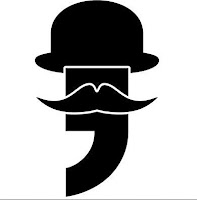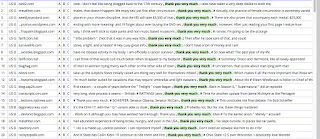Today the
Guardian reported on a new study by Bruno Gonçalves, Lucía Loureiro-Porto, José J. Ramasco, and David Sánchez (
you can get the pdf here) entitled
The End of Empire: the Americanization of English. There are interesting things to find in this study, but I'm taken back to
a panel that
Sandra Jansen,
Mario Saraceni and I presented on 'problems in predicting the linguistic future' last week in Newcastle. The focus of our talks was how the media present change in the English language and how linguists sometimes contribute to skewed presentations of past, present and future—taking part in
the very linguistic ideologies that academic linguists should be regarding with a critical eye. We're now working on making our panel contributions into an article, and I think it'll be a good one.
It's perfectly clear that many originally-American words and spelling standards have spread elsewhere. It would be surprising if they hadn't, since the US has a large population that mostly (and mostly only) speaks English, as well as a very big and very international economy. For me, the problem comes
- (a) when "Americanization" becomes the whole story (because life and language are more complex than that),
- (b) when the story depends upon informational/logical fallacies, and
- (c) when that story is pitched as a story of winners and losers (because language doesn't have to be a competition, and because that winner-loser narrative is often heavily dependent on the simplifications of (a)).
Though I've label(l)ed those points as a/b/c, part of the task I have in writing up the paper is that it's hard to pick apart and label those points—they're very interrelated and also they hide a lot of detail. Here was my first draft—a slide from my talk last week. It's called "panic tools" because I am considering how Americani{s/z}ation* news stories might sit within "moral panic" about language change in Britain—a panic that
Deborah Cameron wrote about in her 1995 book
Verbal Hygiene.
 |
| Slide from Is the future American? (Murphy 2017) |
Anyhow, I was heartened to see that the
Guardian article is by a data scientist,
Mona Chalabi, and therefore it did something that popular news articles rarely do when talking about linguistic research—it sounded a note of caution concerning the data sources for the research: Google books data and Twitter.
Both are problematic resources in terms of making sure the data is what you think it is (here's
one of many Language Log posts about Google Books metadata). This is not a criticism of the paper—we linguists use what we can to find out about language. But then we give caveats about the data, as we should.
But that note of caution is about where they've looked. There's also what you look for. Neither the
Guardian article nor the paper give many caveats about that. The Google Books data was used to see what's happening in the US and UK over time, and the Twitter data to see what English is like across the world, and they searched for a specific list of "American" and "British" spellings and vocabulary.
To give just some examples that deserved more caution (from the paper's appendix of the British and American vocabulary that the authors searched for).
- AmE bell pepper is matched to "BrE" capsicum. But the usual term in British (as in AmE, really) is just pepper or a colo(u)r+pepper (green pepper, etc.) or sweet pepper. Capsicum is primarily Australian English.
- AmE drug store and drug stores are matched to BrE chemist's. Why just the singular possessive? Why no plural? Looking at the same data set as they used (Google Books), it's clear that it's more common to get things from the chemist than from the chemist's. And often (maybe even usually) in contexts in which Americans would say drug store rather than pharmacist—e.g. The boy from the chemist is here to see you. But then, that leads us to another problem: does chemist's really match with drug store, when it also means pharmacist's and pharmacy?
And then there are the problems of polysemy (many-meaninged-ness) and variation, for example (but there are many examples):
- The polysemy problem: in comparing BrE draughts and AmE checkers, are we sure that they're all about games? Some of the draughts will be AmE drafts (for beers or breezes). Some of the checkers could be checking things. If the frequency of use of any of these meanings changes across time, then that can interfere with answering the question of what people call the game. Elastic band is given as the BrE for AmE rubber band, but in my AmE, elastic band can be a name for the covered kind you make ponytails with (and then in the US there are also regional terms for both the stationery kind and the hair kind).
- The variation problem: BrE plasterboard is given as equivalent of AmE wallboard, which I can't say I've ever used. It's drywall or Sheetrock to me in AmE. BrE spring onions is compared with AmE green onions (which, since that's the title of a song, might provide a fair amount of data "noise"), but AmE scallions is not included. BrE mobile phones is searched for, but not mobiles—but it looks to me (using GloWBE corpus) that about 1/3 of mentions of such phones have the shorter term. In the US, calling the phone by the shortened name cell looks to be less common than the equivalent shortened British form. So if you compare mobile phones to (AmE) cell phones, you might be missing a lot of BrE. (Then there's the problem of the not-uncommon spelling cellphones, which they didn't search for either.)
- The vocabulary–spelling problem: AmE license plate v BrE number plate. If BrE or another English borrows license plate, they may very well adapt the spelling to their standard, so why not look for licence plate? What does it mean if that's found? Is it an Americanism or not?
All of this is to say: comparing such things is hard to do well. If it's possible at all.
(If the authors read this and want to correct me on any points in the comments, please do. I may have misread something in my haste.)
I'd also like to sound a note of discomfort and caution regarding talking about AmE and BrE "around the world". This involves a leap of thinking that bothers me: that AmE and BrE are used outside the US and UK. To be fair, the authors mostly talk about BrE or AmE
forms being used. But for us to claim national ownership of those forms is to take a particular nationalist-political stand on English, I think.
It's a common way to talk about English. People in, say, India or Korea might say "I/we speak British English" or "I/we speak American English". But what people generally mean is "I/we use the British (or American) spelling conventions."
If you're learning English as a foreign language (e.g. in Korea), you may well use learning materials that are from the US or the UK. (Your teacher may well be from somewhere else.) You may aim for a particular kind of accent (though a number of studies show that learners are often not very good at telling the difference between the accent they're aiming for and others). What you speak will be English, but it won't particularly be "American English" or "British English". You may aim for a certain pronunciation convention, you may get certain vocabulary. But your English has not developed in Britain or America. It's developing right now where you are. It's absolutely related to British and American English. But it is neither of those. (
Glenn Hadikin's your linguist if you want to know about
Korean English.)
In a place with longstanding English usage, like India, the language has been going in its own direction for some time. The fashions for UK or US spellings may change, and the language will take in new English words from the US and other places, but it also makes up its own, has its grammatical idiosyncrasies, etc. If you look at whether people in India use
off-licence or
liquor store (as this study did), then you're missing the fact that the Indian English
liquor shop is more common than either the American or the British term. (And, interestingly, it looks like a mash-up between American
liquor store and the British use of
shop for retail places.) I don't know what the alcohol-selling laws in India are, but if they're not like Britain's then the British term
off-licence would make no particular sense in India. Instead, Indian English has a nice descriptive phrase that works for India. But what a study like this will find is that there are a few more uses of
liquor store in their Indian data than
off-licence —who knows, maybe because they're talking to Americans on Twitter or because they're talking about American films in which people rob liquor stores. (Spare thought: are there UK films where people rob off-licences?) The study then completely misses the point that, for this particular word meaning, Indian English is Indianized, not Americanized.
The most interesting thing about the study (for me), but not one that gets a mention, is what happens to their data in the Internet age. After 1990, we see the gap narrowing. This does not come as a surprise to me—this is also the point at which Britain falls out of love with the
-ize spelling and starts preferring the
-ise one (having allowed them co-mingle for centuries). In the internet age, we also are seeing grammatical changes that set British and American on different paths (you're just going to have to wait some months for
my book for those details).
 |
| From Gonçalves et al. 2017 |
This graph is based on Google Books data from the US and UK (or at least, that's what Google Books thinks). The yellow line is BrE vocabulary and the black line is BrE spelling (of the particular vocabulary and spellings they were looking for—which include no words with -
ise/-
ize). Those lines are fairly steady--though you can see that the two world wars did no favo(u)rs to British book publishing. You can also see dips in the American lines after WWII. The authors
attribute this to European migration to the US after World War II. I'd
also wonder about American contact with Britain during the war.
But after 1990, those British lines are going up—the spelling one quite sharply. In the paper I gave last week, I talked about (what I've decided to call)
contra-Americanization—British English changing or losing old forms because they look like they
might be American. There seems to be a backlash to (perceived and real) Americanization.
I've congratulated the
Guardian author on the note of caution. I don't want to congratulate the headline writer, though. Nor the researchers' title for their paper.
The paper's title, setting the end of Empire against Americanization, implicitly feeds into that "it's a two-way competition" story.
The
Guardian headline 'Do you want fries with that? Data shows Americanization of English is rising' includes an Americanism that wasn't part of the study. The implication that Americanization means de-Briticization (which falls out from the competition story) doesn't work for
fries. British English now has
fries, but it has very Britishly made it mean something different from what it means in America, since in Britain it contrasts with (rather than replaces)
chips. But the bigger problem in the headline is that "is rising". Given what we've seen in the post-1990 graph line, is that true?
These kinds of things also raise the question: what is meant by
Americanization? Apparently it means non-Americans having the words
fries and
cookies in their vocabulary. But if those words don't mean the same thing to them that they mean to Americans, what does
Americanization mean here?
The moral of this story: talking about "the Americanization" of English makes a lot of assumptions—including that "Americanization" and "English" are each one thing. They ain't.
*I'm too tired to keep up the marking of the
s/z contrast here, so I'm going with the
z because
it's Oxford spelling, good in Britain and America. Don't let any contra-Americanizer tell you otherwise!



























